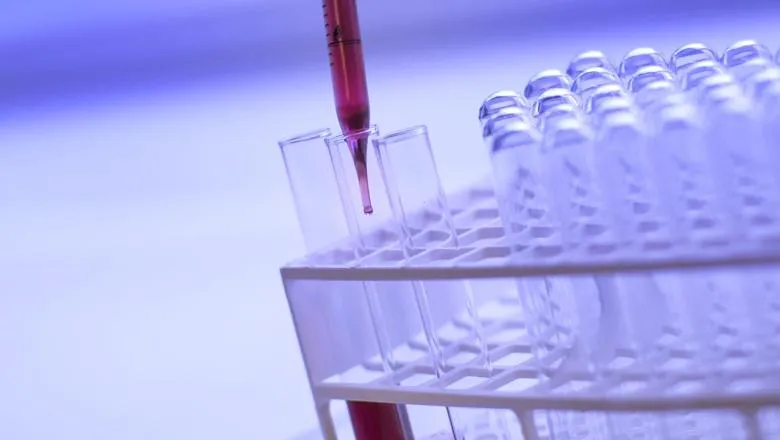NHS-Galleri has set a new standard in the speed of set-up and recruitment to clinical trials. Previous trials of this magnitude would typically have taken five times as long. Accelerating research means that we will find out sooner whether new technology has a role in the control of cancer and, if it does, introducing it within the NHS quickly so that more people can benefit.
Professor Peter Sasieni, Director of The Cancer Research UK & King’s College London Cancer Prevention Trials Unit and one of the trial’s lead investigators
16 July 2022
King's and NHS cancer screening trial hits 140k volunteer target
Over 140,000 people have flocked to take part in the world’s largest trial of a blood test that can detect more than 50 types of cancer, as part of the latest NHS drive to catch the disease when it is generally easiest to treat.

The NHS-Galleri trial is being run by The Cancer Research UK and King’s College London Cancer Prevention Trials Unit in partnership with the NHS and healthcare company, GRAIL, which has developed the Galleri test.
In just one year since the NHS-Galleri trial began, volunteers from across the country have come forward to have a blood test at mobile clinics in over 150 convenient locations, including supermarket and leisure centre car parks and places of worship.
The NHS-Galleri team at The Cancer Research UK & King’s College London Cancer Prevention Trials Unit have worked hard to reach the 140,000-enrolment target.
The team have invited around 1.5 million people aged 50-77 in select postcodes of England via the NHS DigiTrials service, monitoring participant representativeness by postcode to dynamically adjustment enrolment. The multi-disciplinary trials team at King’s have supported the participants at every stage of their journey including invitation, organising participants bookings at a mobile phlebotomy clinic and supporting participants that have a cancer signal in their blood to transition into local NHS hospital for further tests.
Participants will now be invited to attend two further appointments, spaced roughly 12 months apart and it is vital that they attend these follow ups. The test works by finding chemical changes in fragments of DNA that shed from tumours into the bloodstream.
If successful, the NHS in England plans to roll out the test to a further one million people across 2024 and 2025.
NHS chief executive Amanda Pritchard said: “The NHS will not stand still in our efforts to catch cancer earlier and save more lives, rolling out new and innovative ways to detect cancers sooner; from roaming liver trucks, to genetic testing and high street checks, we want to make it as easy as possible for those most at risk to get vital, lifesaving tests.
“Today marks an important milestone in our long-term efforts to catch and treat cancer earlier – we know that certain cancers are harder to detect and a late diagnosis can be devastating for patients and their families, and this trial means thousands could benefit from a diagnosis even before symptoms appear.”
Co-Chief Investigator for the NHS-Galleri trial, Professor Charles Swanton, said: “This is a really big and important trial and it’s a huge achievement that we’ve now enrolled 140,000 trial volunteers. Whilst the first year of the trial may pick up cancers that have existed for some time, the second and third years provide the best opportunity to explore the expected benefits of picking up new cancers at an early stage when treatment is generally more successful. This will help us work out how the test might be used alongside the existing NHS cancer screening programme.”
Sir Harpal Kumar, President of GRAIL Europe said: “We are so grateful for the public’s enthusiasm for this trial and to all those who have volunteered and are looking forward to participants coming back to our mobile clinics from September.
“Previous research has shown that the test is particularly strong at detecting deadly cancers and our hope is that it will help the NHS to reduce the number of cancers detected at a late stage.
“Galleri test results can provide clinicians with an accurate prediction of where the cancer is located in the body and, with the low rate of false positives we are hopeful that it will work well alongside existing cancer screening in the UK – the results of this trial will be key to our understanding.”
Once participants have attended follow up appointments, researchers, including teams at The Cancer Research UK & King’s College London Cancer Prevention Trial Unit, can begin to understand whether the test could be used in the future as part of the NHS cancer screening programme.
Not only is this trial a major step in NHS efforts to catch cancers sooner, but trial organisers have made particular efforts to achieve representation of people from minority ethnic backgrounds, who are often less likely to take part in medical research studies.
Activity included working with specific GP practices to send invitations to their ethnic minority patient lists, community group briefings, leaflet distribution in relevant community settings such as places of worship, working with community champions and targeted social media posts.
While it is too early to report on the results of the trial, a number of participants have been referred for urgent NHS cancer investigations following the detection of a cancer signal.
Those joining the trial were aged of 50 to 77 years old and did not have signs of cancer at the time of enrolment.
Mobile clinics will return to towns and cities from September this year and will follow up with volunteers approximately one year after their initial appointment.
The trial is operating with the support of eight NHS Cancer Alliances across England that span Cheshire and Merseyside, Greater Manchester, the North East and North Cumbria, West Midlands, East Midlands, East of England, Kent and Medway, and South East London.

